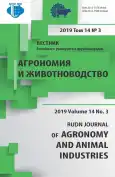Detection of genes associated with qualitative characteristics of gluten
- Authors: Al-Azawi N.M.1, Abed Z.A.1, Al-Issawi M.2
-
Affiliations:
- University of Baghdad
- University of Al-Anbar
- Issue: Vol 14, No 3 (2019)
- Pages: 196-208
- Section: Genetics and plant breeding
- URL: https://journal-vniispk.ru/2312-797X/article/view/329146
- DOI: https://doi.org/10.22363/2312-797X-2019-14-3-196-208
- ID: 329146
Cite item
Full Text
Abstract
The research was aimed at analyzing allelic variants of protein in wheat varieties used in Iraqi bakery and evaluating these varieties via genetic source using grain quality selection. Variety tests were carried out at field experimental station of Russian State Agrarian University - Moscow Timiryazev Agricultural Academy. The analysis of wheat grain quality was made after harvesting in mid August. Allele state of genes controlling the quality of gluten in wheat grain was determined using the PCR method. Samples of Iraqi wheat varieties 12 (soft wheat) and One (durum wheat) are characterized by considerable variation of gluten content and quality. The five varieties whose genotype include an allelic variant of high molecular weight glutenins Glu-D1 5+10 and subunit Glu-A1-2* (Fateh, Tamuz-3, Abighreb-3, Iraq and Maxibak) were also studied. The highest gluten content was from 31.5 % in Iraq to 35.3 % in Fateh variety, while the gluten quality was not below the second group. Five varieties - Farah, AlMurug, Sham-6, Tahadi and Sabirbeg - had unusual combination of the allelic state of Glu-D1 2+12 (which is usually associated with low gluten quality) with a 2* subunit for the Glu-A1 locus, which determines the possibility of improving gluten quality to the wheat varieties.
About the authors
Nagham Majeed Al-Azawi
University of Baghdad
Author for correspondence.
Email: naghamalazawi@yahoo.com
Baghdad, Iraq
Ziyad Asmail Abed
University of Baghdad
Email: naghamalazawi@yahoo.com
PhD, Department of Field Crop Sciences
Baghdad, IraqMohammed Al-Issawi
University of Al-Anbar
Email: naghamalazawi@yahoo.com
PhD, Department of Field Crops
Al-Ramadi, IraqReferences
- Wiesner H, Seilmeier W, Belitz HD. Vergleichende untersuchungen über partielle aminosäuresequenzen von prolaminen und glutelinen verschriedener getreidearten. Z Lebensm Unters Forsch. 1980; 170(1):17-26. doi: 10.1007/BF01113461
- Romanova EV, Martynov OL, Tumanyan AF. 2003. Biochemical polymorphism of proteins in crops. Vestnik of the Russian agricultural science. 2003; (6):39-40. (In Russ).
- Konarev AV. Development of biochemical and molecular-genetic studies of the global plant genetic diversity conserved at the Vavilov institute (VIR). Agrarnaya Rossiya (Agrarian Russia). 2006; (6):2-3. (In Russ). doi: 10.30906/1999-5636-2006-6-2-3
- Romanova EV, Al Labban AA. Influence of alleles state of protein loci on qualities of wheat meal. Agrarian science. 2011; (7):18-19. (In Russ).
- Torbica A, Antov M, Mastilović J, Knežević D. The influence of changes in gluten complex structure on technological quality of wheat (Triticum aestivum L.). Food Research International. 2007; 40(8):1038-1045. doi: 10.1016/j.foodres.2007.05.009
- Jolly CJ, Rahman S, Kortt AA, Higgins TJV. Characterization of the wheat Mr 15,000 “grain-softness protein” and analysis of the relationship between its accumulation in the whole seed and grain softness. Theoretical and Applied Genetics. 1993; 86(5):589-597. doi: 10.1007/BF00838714
- Gautier MF, Aleman ME, Guirao A, Marion D, Joudrier P. Triticum aestivum puroindolines, two basic cystine-rich seed proteins: cDNA sequence analysis and developmental gene expression. Plant Molecular Biology. 1994; 25(1):43-57. doi: 1007/BF00024197
- Temirbekova SK, Ovsyankina AV, Ionova NE, Cheremisova TD, Afanasyeva YV, Mitrofanova OP, Al-Azawi Nagham MH. Enzymatic activity in the resistance stress of winter wheat from different sources in the Non-black land of the center of Russian Federation. Plant Archives. 2019; 19 (1):1653-1658.
- Douliez JP, Michon T, Elmorjani K, Marion D. Structure, biological and technological functions of lipid transfer proteins and indolines, the major lipid binding proteins from cereal kernels. J Cereal Sci. 2000; 32(1):1-20. doi: 10.1006/jcrs.2000.0315
- Pasha I, Anjum FM, Morris CF. Grain hardness: a major determinant of wheat quality. Food Science and Technology International. 2012; 16(6):511-522. doi: 10.1177/1082013210379691
- Blochet JE, Chevalier C, Forest E, Pebay-Peyroula E, Gautier MF, Joudrier P et al. Complete amino acid sequence of puroindoline, a new basic cystine-rich protein with unique tryptophanrich domain, isolated from wheat endosperm by Triton X-114 phase partitioning. FEBS Letters. 1993; 329(3): 336-340. doi: 10.1016/0014-5793(93)80249-T
- Morris CF. Puroindolines: the molecular genetic basis of wheat grain hardness. Plant Molecular Biology. 2002; 48(5-6):633-647. doi: 10.1023/A:1014837431178
- Payne PI, Nigtingale MA, Krattiger AF, Holt LM. The relationship between HMW glutenin subunit composition and the breadmaking quality of British-grown wheat varieties. J. Sci. Food and Agriculture. 1987; 40(1):51-65. doi: 10.1002/jsfa.2740400108
- Nettevich ED. Grain quality of spring wheat in relation to resistance to preharvest sprouting. Russian Agricultural Sciences. 1999; (6):6-8. (In Russ).
- Obukhova LV, Laikova LI, Shumny VK. Analysis of storage proteins (prolamines, puroindolines and Waxy) in common wheat lines Triticum aestivum L.× (Triticum timopheevii Zhuk.× Triticum tauschii) with complex resistance to fungal infections. Russian Journal of Genetics. 2010; 46(6):672-676. (In Russ).
- Semenov OG. Study of fertility reducing agents of Triticum aestivum L. on the cytoplasm T. timopheevi Zhuk. Conference proceeding: Collected scientific works: Cytoplasmic male sterility and plant breeding. Kiev: Naukova dumka Publ; 1979. p. 207-209. (In Russ).
- Murashev VA, Kuperman FM. Morphological and physiological analysis of potential and real productivity of Einkorn wheat and soft wheat. Biologicheskie nauki. 1976; (3):86-89. (In Russ).
- Luo C, Griffin WB, Branlard G, McNeil DL. Comparison of lowand high molecular-weight wheat glutenin allele effects on flour quality. Theor Appl Genet. 2001; 102(6-7):1088- 1098. doi: 10.1007/s001220000433
- Liang D, Tang J, Pena RJ, Singh R, He X, Shen X, et al. Characterization of CIMMYT bread wheats for high-and low-molecular weight gluteninsubunits and other quality-related genes with SDS-PAGE, RP-HPLC and molecular markers. Euphytica. 2010; 172(2):235- 250. doi.org/10.1007/s10681-009-0054-x
- Rogers WJ, Payne PI, Harinder K. The HMW glutenin subunit and gliadin compositions of German-grown wheat varieties and their relationship with bread making quality. Plant Breeding. 1989; 103(2):89-100. doi: 10.1111/j.1439-0523.1989.tb00356.x
Supplementary files










